King Hu’s Legend of the Mountain (1979)
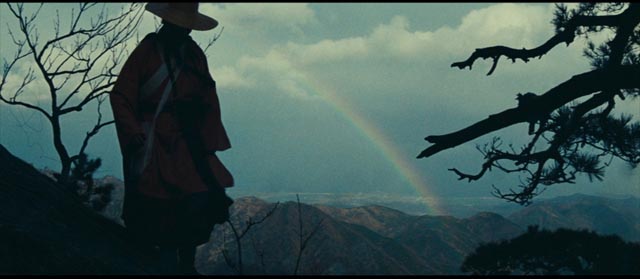
I first encountered the work of King Hu in early 1981 in Hong Kong. I was lucky enough to see most of his major works in a short time – a special program which included Come Drink With Me (1966), Dragon Gate Inn (1967), Anger (1970, his episode of a four-part anthology), and the two features he made back-to-back in Korea in 1979, Raining in the Mountain and Legend of the Mountain; and then, as the opening film of the 5th Hong Kong International Film Festival, A Touch of Zen (1971). Looking at my (rather sketchy) notes from that time, I see that the latter impressed me least – an opinion which seems quite inexplicable to me now. I found it disappointing after “the grace of Legend of the Mountain”.
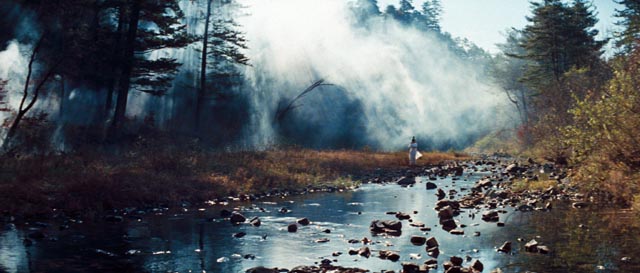
But beyond my dodgy perception at the time, there’s a bit of a mystery about my experience of Legend of the Mountain. I recall quite clearly seeing a three-hour version during that special program; yet when I finally managed to find a copy on DVD (a Chinese release from 2003), it was only 110 minutes and seemed to lack the lyrical qualities I remembered. Now Masters of Cinema have brought out a restored version of the film on Blu-ray and it does indeed run 191 minutes and conforms much more closely to that distant memory. However, in an interview on the disk, film historian Tony Rayns states that this long director’s version was never released, that Hu himself cut his film down to make it (hopefully) more commercially viable. So perhaps the print I saw in that program was a copy of Hu’s own cut specially acquired for that screening … or was I just deluded for all these years?
Legend of the Mountain is quite different from Hu’s martial arts movies, which themselves did a great deal to establish the modern wuxia genre with their acrobatic, even balletic, swordfight sequences which often include gravity-defying aerial feats by heroes and villains alike. There’s no such combat in Legend (though there is some flying), nor is the film built around complex conflicts between and among political factions. Rather it belongs to another stream of Chinese fantasy in which hapless characters become involved unwittingly with ghosts and other supernatural spirits.
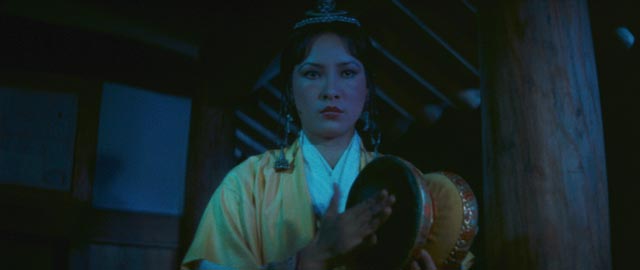
Scholar Ho Yunqing (Hu favourite Shih Chun) takes a commission to transcribe a Buddhist sutra whose purpose is to guide spirits trapped on this plane to the next stage of their existence. The text is needed at a distant border outpost where many who died in battle have not yet moved on. Ho’s journey is long and along the way he is warned not to go. Although he seems not to notice, a Buddhist lama (Ng Ming-choi) is walking the same path. As Ho crosses a mist-shrouded river, he sees in the distance a woman playing a flute; he watches enchanted, and she fades from view. He sees her again several times, but in each instance she vanishes as he draws near. In crossing that river, he has apparently entered a more mysterious realm … a suspicion which is eventually confirmed as he meets and becomes involved with a number of strange characters.
Ho is being watched over by a number of spirits, some more benevolent than others, all of whom seek control of the sutra. Most powerful among them is a beautiful woman named Melody (Hsu Feng, a strong presence in many of Hu’s films), once the favourite of the local governor, but now a demon who wants the sutra because it will give her power over all the other ghosts. She already controls a number of them through force of will, and manipulates Ho into marrying her. The lama seen along the road emerges as her main opponent, and a young woman named Cloud (Sylvia Chang) – the one seen playing the flute – tries to aid and protect Ho.
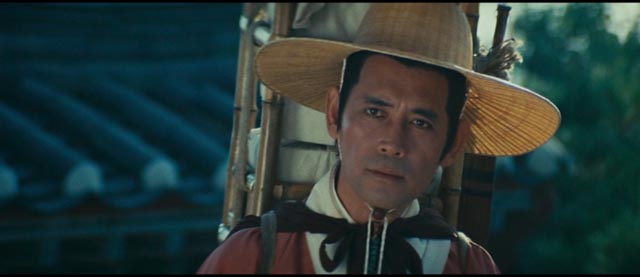
In place of swordfights, the battles in Legend of the Mountain are magical, most of them fought through the music of hand drums which takes on a hypnotic power. Hu creates a dream-like atmosphere which evokes invisible forces, individual sequences drawn out at length to put the viewer into a kind of trance (Ho’s walk to the border takes up the film’s first twenty minutes or so), producing an oneiric effect which goes even further than the final act of A Touch of Zen in its attempt to visualize a spiritual state. All of this might try the patience of a viewer seeking the more visceral excitement of a typical martial arts film, but Hu’s focus here is not on narrative and action but almost purely on mood. The film’s otherworldly ambience derives from its languid pace, the circularity of its narrative events, its repetitions, and its digressions into the purely pictorial as it pauses to observe the details of landscape, of plants and insects, of light reflecting off water… Despite its length, Legend of the Mountain has a kind of gossamer delicacy and whether or not one decides that Hu has pushed things too far (his fog machines work overtime and he frequently uses strong colour filters to denaturalize the imagery) may depend on one’s mood at the moment of viewing.
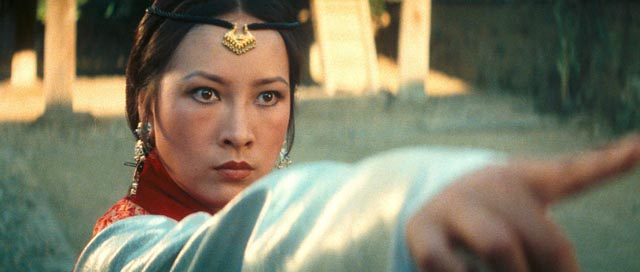
Personally, I appreciated the Blu-ray because it reconfirmed my thirty-seven year old memory of seeing the film that first time in Hong Kong.
The Masters of Cinema dual-format release includes two informative featurettes – an interview with Tony Rayns which draws on his personal connections with King Hu, and a video essay by David Cairns on the visual qualities of Hu’s work. The booklet essay by critic Glenn Kenny delves into the problems a Western viewer may have with the specifically Chinese qualities of the film.
Comments